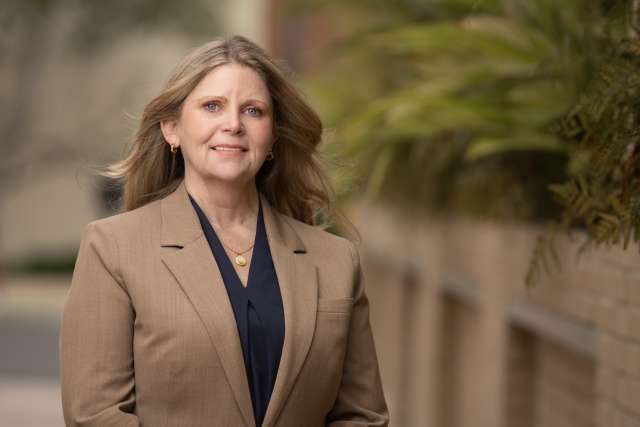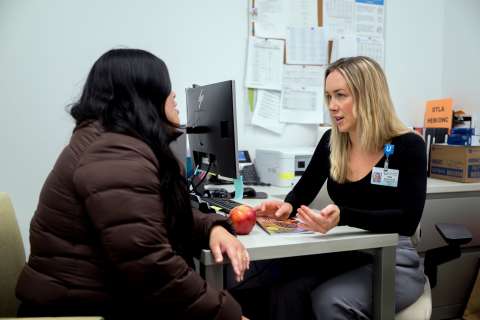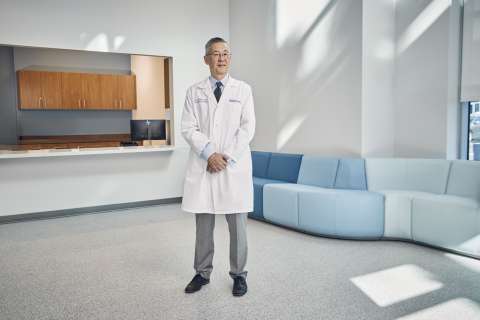Shannon La Cava, PsyD, has been named as the new director of the Simms/Mann-UCLA Center for Integrative Oncology, bringing a wealth of experience in meeting the varied emotional needs of people with cancer.
Dr. La Cava, an integrative psychologist specializing in psychosocial oncology, will start her post on June 20. She previously spent almost eight years at the nonprofit Cancer Support Community Los Angeles. Most recently, she served as chief clinical officer and before that as clinical program director.
“I’m really excited for the opportunity to join Simms/Mann and UCLA and get started,” Dr. La Cava said. “It’s a great team that I’m going to be joining.”
Whole-person care
The Simms/Mann-UCLA Center for Integrative Oncology was established in 1994 to provide whole-person care to cancer patients from the time of diagnosis through survivorship. Services include counseling, support groups, nutrition, integrative medicine and spiritual support.
“There’s so many disciplines that come together to make sure the person living through a diagnosis is also being treated as a person in all these other regards,” Dr. La Cava said. “It’s not just the treatment for the cancer – it’s making sure they’re connected and supported in all these other ways, and their families as well.”
The supportive services complement the medical care patients receive from UCLA Health. For instance, therapists provide individual counseling at UCLA cancer clinics that extend from south Orange County to San Luis Obispo. The clinicians are embedded in the medical team, consulting and collaborating with oncologists who also refer patients to them.
“It’s one referral, but a whole system of services – that is what I think is beautiful about Simms/Mann. And that it’s grown to so many community clinics is so valuable,” Dr. La Cava said. “It’s an incredible one-stop for multiple services for someone who might not even know what they need or what’s available.”
The majority of services, including counseling, are provided for free, which Dr. La Cava said is crucial for promoting equitable access. She has served as the American Psychological Association’s Committee Chair on Health Equity. She noted that medical treatment for cancer can be very costly because of differences in health insurance coverage.
“Being able to have this social-emotional support available at no cost is huge,” Dr. La Cava said.
Language access is another important equity issue, she said. Simms/Mann works to deliver culturally competent care to meet the linguistic, social, regional and cultural needs of patients.
Personal connection
Dr. La Cava was first drawn to working with people with cancer and their families after her aunt, with whom she was very close, was diagnosed with pancreatic cancer in 2003.
Dr. La Cava, who was not yet a psychologist, spent many hours sitting with her aunt on her balcony.
“I know we probably spoke with each other about lots of stuff, but my most memorable moments were just sitting together, sometimes holding hands,” Dr. La Cava said. “She called me her rock.”
Her aunt died three months after her diagnosis.
Dr. La Cava started volunteering with the American Cancer Society and decided to go back to school, earning a master’s degree in psychology from Pepperdine University. She went on to complete a doctorate in clinical psychology from The Chicago School of Professional Psychology.
Dr. La Cava was drawn to offering comprehensive support to the whole person.
“When there is a diagnosis of cancer or any chronic illness, the impact that has on the person and their loved ones, that’s what I really wanted to focus on,” Dr. La Cava said.
She has worked extensively with cancer patients across all life stages, from children and young adults to retirees.
Dr. La Cava said a family systems approach can help build communication skills and resilience within a family.
“It’s being aware of the whole family unit and not coming in and treating one, but being able to understand the needs of all,” she said.
For instance, Dr. La Cava wrote her dissertation on the experiences of siblings of pediatric cancer patients.
“When there is a child diagnosed with cancer, the family plate is full and it’s very hard to meet the needs of all,” she said. “Some children may feel like they might need to get sick in order to get attention.”
Even after treatment is complete, people who no longer have evidence of cancer may desire support as they contemplate re-entering the workforce or forging a new normal.
“There’s so much that can be offered to that survivor so they’re not feeling untethered,” she said.
Dr. La Cava noted that while the COVID-19 pandemic initially resulted in more isolation for people with cancer, it also ushered in advances in telehealth services that have broadened access to support, including at Simms/Mann. She said a person experiencing side effects from treatment may feel more comfortable participating in an online support group from home.
“Someone diagnosed today is getting to make choices,” she said. “Do they want to get services in person or distance themselves from the public for their own health? There are options that were not there before.”
As she embarks on the Simms/Mann director role, Dr. La Cava said she looks forward to learning from the staff and seeing what might be next for the center’s growth.
“I’m really excited to be part of such an incredible system that I hold in such high regard,” she said.
Courtney Perkes is the author of this article.




